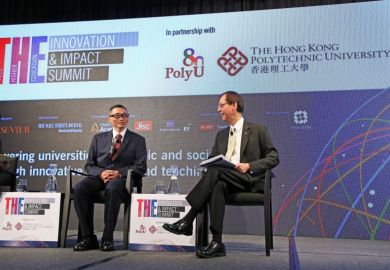The research culture of US universities is stuck in the past and must be overhauled if diseases such as cancer are to be defeated, a leading expert has warned.
Greg Simon, director of the Biden Foundation’s Cancer Initiative and former executive director of the White House Cancer Moonshot Task Force, declared that “everything has changed” since former US president Richard Nixon declared “war on cancer” in 1971, “except…our research system”.
“Everything else has changed – the way you communicate, the way you travel, the way you shop, the way you bank…Everything has changed except we still conduct research the same way we did after World War Two,” he told the Times Higher Education Innovation & Impact Summit.
The White House Cancer Moonshot Task Force was created by former US president Barack Obama and former vice-president Joe Biden to advance the prevention, diagnosis and treatment of cancer.
During a keynote address at Hong Kong Polytechnic University, Mr Simon spoke about how, while leading the task force, he changed the culture within US government departments in order to encourage collaboration and innovation.
Access all the coverage from the Innovation & Impact Summit 2017
But Mr Simon said “everything about the way universities operate” and collaborate with other institutions, the government and the private sector also needed to change in order for the Cancer Initiative to achieve its goals.
“We have to go from individual to team science; we have to go from strictly basic research as the goal to translational research; we have to go from publishing as the goal to practical applications; we have to go from tenure as a lifetime achievement to impact as a lifetime achievement; and we have to go from being risk-averse to risk-seeking,” he said.
Mr Simon claimed that “most universities do not want to change”, which is “why you see innovation happening outside of universities…in small biotech companies that take ideas from universities because they’ve reached their limit inside the university environment”.
He added that the university sector has “fallen in love with the illusion of the individual, usually white, man who is going to solve a problem by himself in a white coat in a laboratory”.
“That has been the image of research for decades and it never was true and it never will be true,” he said, adding that all the famous inventors of the world had collaborators.
When asked how the tenure system could change, he said that the path to tenure was “way too heavy on publications and too light on impact” and that the criteria should be broadened to take into account collaboration and non-academic work.
He also criticised the tradition of first and last authors of research papers “taking all the credit”.
“That’s just not fair to the marching army of lab slaves who are doing so much of the work and are so much more productive in the modern environment than in the days when they had to type out everything,” he said.
Mr Simon added that he is a “big believer in basic science” but translational science funding has been “way too small to really harness the benefit of basic science and to test that basic science in the real world environment”.
During a question and answer session after his speech, Mr Simon was asked about the future of scientific research in the US, given president Donald Trump’s perceived anti-science stance.
Mr Simon said he was not concerned about science funding being cut, noting that Congress reversed several of Mr Trump’s planned cuts earlier this year, but is “worried” that the president’s rhetoric will lead to a “diminution of kids going into science”.
“When the president of the US says we want to cut 20 per cent of NIH [National Institutes of Health] funding and all of science at EPA [Environmental Protection Agency], every high school counsellor in America discourages high school students from going into science,” he said.
ellie.bothwell@timeshighereducation.com
Watch: Greg Simon at the THE Innovation and Impact Summit 2017
Register to continue
Why register?
- Registration is free and only takes a moment
- Once registered, you can read 3 articles a month
- Sign up for our newsletter
Subscribe
Or subscribe for unlimited access to:
- Unlimited access to news, views, insights & reviews
- Digital editions
- Digital access to THE’s university and college rankings analysis
Already registered or a current subscriber?










